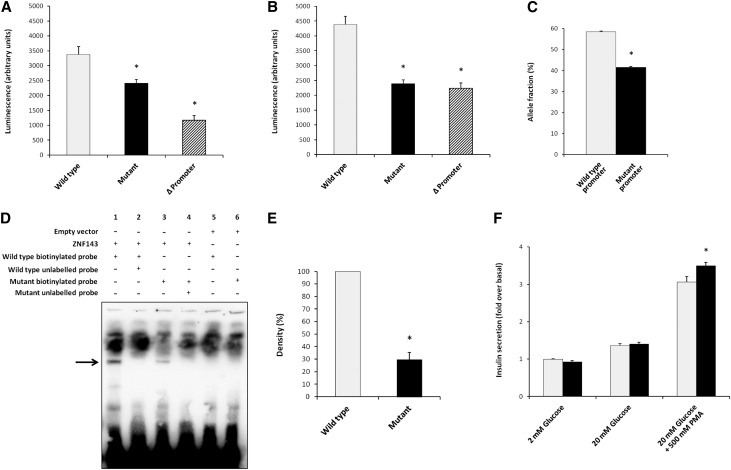Figure 4.
The c.-167G>T mutation impairs promoter function. Luciferase activity is significantly reduced with mutant compared with wild-type promoter in (A) human pancreatic β cell line 1.1B4 and (B) human kidney cell line RPTEC/TERT1. Light gray bars show luciferase activity with wild-type promoter, black bars with the c.-167G>T mutation, and the crosshatched bars show activity with deletion of the ZNF143 binding site c.-163_-180del. Asterisk indicates significance (wild type versus respective mutation; P<0.01). (C) In kidney cells derived from patient 6.1, expression of the allele with the mutant promoter (c.-167G>T) is significantly reduced compared with the other allele. Asterisk indicates significance (P<0.01). (D) EMSA demonstrating reduced affinity of mutant promoter to ZNF143. Note the impaired binding of ZNF143 (indicated by arrow) to the mutant (lane 3) compared with wild-type (lane 1) PMM2 promoter. Binding is specific, because addition of excess unlabeled wild-type (lane 2) or mutant promoter probe (lane 4) abolishes binding to the labeled probes. Moreover, no specific binding is seen in the negative control (no ZNF143) to either wild-type (lane 5) or mutant (lane 6) promoter probe. (E) Densitometry confirms significantly reduced affinity of ZNF143 to mutant promoter (P<0.01). Bands from lane 1 and 3 indicated by arrow in (D) were measured by densitometry and results pooled from five independent experiments. (F) Deglycosylation alters insulin secretion in a murine pancreatic β cell line (MIN6). There is significant increase in insulin secretion after stimulation with high glucose (P<0.01), as expected. Note the significant (P<0.01) increase in insulin secretion with deglycosylation after further stimulation with phorbol-12 myristate-13 acetate (PMA).

